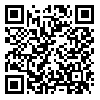BibTeX | RIS | EndNote | Medlars | ProCite | Reference Manager | RefWorks
Send citation to:
URL: http://edujournal.zums.ac.ir/article-1-490-en.html
Background and Objective: Midwifery students should consider both maternal and fetal health. Hence, this study was conducted to compare the effects of simulation video education with lecture on midwifery students’ knowledge and self-confidence regarding cardiopulmonary assessment.
Materials and Methods: In this quasi experimental study, 28 midwifery students randomly allocated to two groups of simulation video education and lecture. Data was collected using a three section questionnaire consisted of midwifery students’ demographic characteristic, knowledge and self-confidence in cardiopulmonary assessment. Data was collected before and after training methods and was analyzed using SPSS19 software and independent t‑test and paired t‑test.
Results: The mean score of knowledge and self-confidence before and after intervention in both groups of simulation video education and lecture was not significant (P<0.0001). Besides, results indicated that, mean scores of knowledge 9(±1.24) and self-confidence 26.14(±3.32) in stimulation video group were more than the mean scores of knowledge 5.78(±0.75) and self-confidence 15.57(±4.11) in lecture group. This difference was statistically significant (P<0.0001).
Conclusion: According to the findings, using simulation methods such as video approach might be more effective in improving students’ knowledge and self-confidence regarding cardiopulmonary assessment than lecture. Thus, video simulation approach could be used as a substitute or supplementary method to improve students’ learning and to achieve mastery.
Received: 2015/03/23 | Accepted: 2015/08/10 | Published: 2016/01/4
| Rights and permissions | |
 |
This work is licensed under a Creative Commons Attribution-NonCommercial 4.0 International License. |



